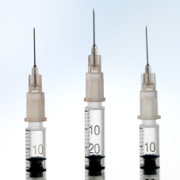 Photo: Getty Images
Photo: Getty Images
Whooping cough is on the rise in teenagers and adults, even though they were vaccinated as young children. Jennie S. Lavine of Pennsylvania State University and colleagues investigated the trends in infection rates, and produced a mathematical model for immune boosting. Whooping cough is known as pertussis in the medical literature, and is caused by the bacterium Bordetella pertussis.
Before vaccines were available, almost all cases of whooping cough occurred in children younger than 10 years of age. Today the peak for infection rates is in the teenage years.
There are three hypotheses for this changing pattern, Lavine explained. Diagnostic methods could be catching more teenage cases today, or the bacteria could be evolving, or the immunity produced by vaccination may wear off faster than expected.
“There is ample evidence,” Lavine reported, “that immunity to whooping cough wanes after both vaccination and natural infection.” However, when the disease was common in children, those who survived were frequently re-exposed as teenagers and adults.
This exposure to sick children may have acted as a natural booster for their immune response. Lavine's mathematical model showed that the immune boosting hypothesis explains the age incidence data better than the competing hypotheses.
The Centers for Disease Control and Prevention (CDC) provides the following pertussis vaccine recommendations on its web site:
1. Children should receive five doses of the DTaP vaccine, at ages 2 months, 4 months, 6 months, 15 to 18 months, and 4 to 6 years of age. DTaP stands for diptheria, tetanus, and acellular pertussis. The upper case letters indicate full strength doses.
2. Pre-teens should get the Tdap vaccine at age 11 to 12 years. Tdap contains a full strength dose of tetanus vaccine, plus reduced dose diptheria and acellular pertussis.
3. Adults who did not receive the Tdap booster should receive one dose of Tdap. This can replace the 10-year tetanus booster vaccine.
4. Pregnant women who have not previously received the Tdap booster should get one dose during the third trimester or late second trimester.
5. Adults 65 and older who have close contact with children should receive a Tdap booster.
References:
1. Lavine JS et al, “Natural immune boosting in pertussis dynamics and the potential for long-term vaccine failure”, Proceedings National Academy of Sciences USA 2011; 108(17): 7259-64. http://www.ncbi.nlm.nih.gov/pubmed/21422281
2. Centers for Disease Control and Prevention. Pertussis (Whooping Cough). Web. Nov. 6, 2011.
http://www.cdc.gov/vaccines/vpd-vac/pertussis/default.htm#vacc
Linda Fugate is a scientist and writer in Austin, Texas. She has a Ph.D. in Physics and an M.S. in Macromolecular Science and Engineering. Her background includes academic and industrial research in materials science. She currently writes song lyrics and health articles.
Reviewed December 1, 2011
by Michele Blacksberg RN
Edited by Jody Smith





Add a CommentComments
There are no comments yet. Be the first one and get the conversation started!